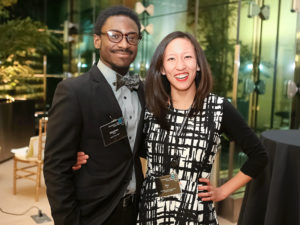In his own words
MD/PhD candidate Stephen Allsop on studying social cognition in the Tye Laboratory

Stephen Allsop with BCS faculty member Kay Tye ’03
What is social cognition?
In a nutshell, social cognition is the idea that we rely on social cues from other animals, or other humans, to understand things about our environment. There are many interesting questions we can ask about how the social brain works. For example, how are we able to take someone else’s experience and use it to learn about something we didn’t experience for ourselves? For example, if I see someone touch a hot stove and get burned, I learn that touching a hot stove is a bad thing even though I didn’t get burned myself.
The approach we take to understanding how the brain allows us to engage in social behavior is to look at very basic, simple forms of social communication and see if we can understand those on a circuit level. To do this, I study observational fear learning in mice to see if one mouse can learn from watching the negative experience of another mouse. Many animals freeze when they are in a defensive state. If the observing mouse freezes when exposed to the cue that signaled danger for the demonstrator mouse, it shows that it picked up on that danger signal. As we run the experiment, we record information from the brain regions of the mouse that’s observing, learning where in the brain these things are actually being encoded and what cells are learning about this cue.
Why are you pursuing an MD/PhD?
Traditionally MD/PhDs want to study things during the PhD part of their program that they might want to use clinically. In my case, I really see myself doing something in psychiatry, which is part of the reason I chose to study the brain for my PhD at MIT. There are a few ways you can tie the nervous system into a medical life, and I’m looking forward to exploring those options. I have really enjoyed grad school at Brain and Cognitive Sciences. I’m so fortunate to be in a great laboratory and have a fantastic PI in Kay Tye, Assistant Professor of Neuroscience – someone who has been incredibly supportive of my work here at MIT and knows exactly how to motivate me to do my best work. Emery Brown, Edward Hood Taplin Professor of Computational Neuroscience and Health & Technology, and my MD/PhD advisor, has also been a great resource. On my main research project, I ended up collaborating with a postdoc in his laboratory.
What are your plans after finishing your degree?
 In 20 years, I hope to be the PI of a successful laboratory that does interesting research that people find compelling and transformative. I also want to see patients, helping them work through and with whatever disorders they might struggle with. Lastly, I am a professional jazz musician, and I want to keep going with my music, doing shows and maybe having an album or two.
In 20 years, I hope to be the PI of a successful laboratory that does interesting research that people find compelling and transformative. I also want to see patients, helping them work through and with whatever disorders they might struggle with. Lastly, I am a professional jazz musician, and I want to keep going with my music, doing shows and maybe having an album or two.